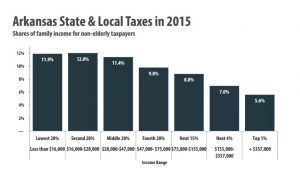
Legislators have just kicked off the 2017 legislative session, and ideas for big changes are buzzing around the Capitol. AACF will be on the ground advocating for bills that are best for kids and families in our state. In order to make Arkansas a better place for all of us, AACF hopes that this year:
- We heed the warnings of economists and Kansas school advocates. Most major studies over the past 15 years show that personal income tax cuts don’t cause economic growth. That became apparent in Kansas after their failed tax cut experiment. Governor Sam Brownback expected his tax cuts to be “like a shot of adrenaline into the heart of the Kansas economy.” What resulted was a sharp drop in revenue (over 10 percent less in the first year) without any of the promised economic growth. Kansas’s budget is a disaster, the governor has nearly bankrupted reserve funds to scrape by since the cuts and schools are taking a big hit. All of this has been in exchange for mediocre job growth (jobs grew by only 2.6 percent compared to 4.4 percent average national growth in 2013).
- We have a smart end game. Last session, legislators cut taxes wildly and then threw up their hands at the end of the session when there wasn’t any money left to pay for case workers for abused and neglected children, libraries, after-school and summer programs and more. If we want to invest in a better Arkansas, we are going to have to pay for it. There will likely be significant holes in funding for critical programs serving vulnerable or at-risk children and families–such as child welfare, juvenile justice, pre-K, and after-school/summer programs. This time, we hope decision makers at the Capitol keep that in mind from the beginning.
- Legislators remember that all Arkansans pay into the system. Even Arkansas employees who make too little to owe any income tax still pay plenty in other taxes. In fact, they pay much more than the wealthiest as a share of their income if you add up all state and local taxes. That is largely because low- and middle-income people are more likely to spend money on things that are subject to other taxes, like sales tax. The bottom 60 percent of earners in our state pay twice as much in state and local taxes than the top one percent (as a share of their income). That means if you make less than about $47,000 a year, you are paying about 12 percent of your income to state and local taxes. If you make more than $357,000 a year, you pay less than 6 percent. All money is money. To a working family, a dollar from income tax is just as expensive as a dollar from sales tax. And yet legislators frequently balk at tax policies like a state-level Earned Income Tax Credit (EITC) that would help low-income Arkansans move into the middle class, because “those people aren’t paying anything into the system.”
 We help grow our middle class and help the only people left out of the last two rounds of tax cuts. The most direct and common sense way to do this is with A state EITC. A state EITC would help promote equity in our tax structure and reward work. It would also give a break, finally, to the bottom 20 percent of earners who got nothing out of the past two rounds of tax cuts that totaled $242 million.
We help grow our middle class and help the only people left out of the last two rounds of tax cuts. The most direct and common sense way to do this is with A state EITC. A state EITC would help promote equity in our tax structure and reward work. It would also give a break, finally, to the bottom 20 percent of earners who got nothing out of the past two rounds of tax cuts that totaled $242 million.- There is accountability for corporate welfare. Any tax cuts/incentives enacted under the guise of economic development should require full public transparency and disclosure in terms of which companies and industries are likely to be impacted, the benefits they each will receive, the projected gain in Arkansas jobs and tax revenues, etc.
- Our tax code is meaningfully simplified. Our tax handbook is long because of exemptions, not tax brackets. Yet, many times lawmakers call for collapsing our tax brackets in the name of simplification. The brackets in our income tax system are not what is complicated. It takes a few key strokes on the calculator to figure an income tax bracket – no accountant is stumped on those calculations and no accountant would save any time figuring returns if we removed some brackets. What complicates tax codes are the almost endless exemptions afforded to special interest groups. Special interest groups should not be allowed to manipulate the tax code to their advantage. These unnecessary special exemptions should be eliminated from the tax code.
Keep up to date with our progress on tax policy by checking our website, following us on Facebook and Twitter, and signing up for our legislative alerts.
Table source: ITEP
